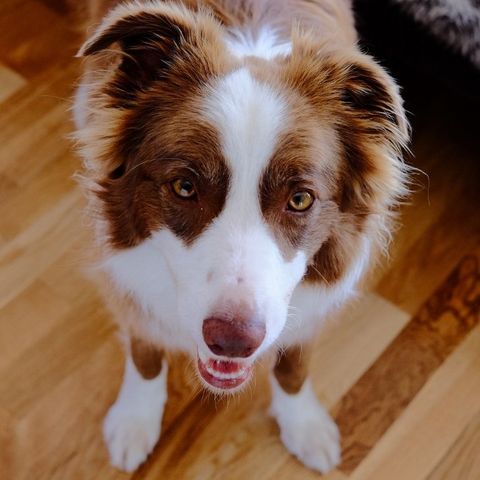DON'T FEED DOGS...
Whenever a house-sit includes caring for pets you’ll invariably find owners telling you what, when and how they feed them. For us organised dog meals have ranged from daily scoops of shop-bought dog biscuits to home-cooked, nutritionally balanced, pre-frozen meals, labelled with dates for us to use them.
However, two other important aspects relating to food that are less often covered are, ‘What do you give them for treats, and do they get scraps while you’re cooking?’
It’s not so much that you have to perfectly replicate the owners’ treat routine, it’s more about knowing what those pleading puppy eyes are asking for and when you’re expected to give in.
In most cases, dog owners have a supply of pre-packaged treats in the cupboard. This article, though, is to cover the other moments… when you’re surrounded by human food and tempted to share, but aren’t quite sure if it’s safe for them.

So here you go, a list of foods you should definitely give to dogs, beyond
alcohol, salty snacks, mouldy, spoiled and fatty foods, and all the other things we know are bad for us.
AVOCADO
Whilst we keep hearing how good avocado is for us, it’s not so good for animals, especially since it can kill birds and cause all kinds of cardiovascular problems.
CHOCOLATE, COFFEE AND CAFFEINE
We all know we shouldn’t give chocolate to animals don’t we - especially dogs. Dark chocolate is the worst, in fact… the darker chocolate, the worse it is. This is due to its levels of methylxanthines, a substance found in the cacao seeds used to make chocolate, coffee and caffeine.
CITRUS
All parts of citrus plants and fruit (that’s lemons, limes, oranges, grapefruit, etc.) include varying amounts of citric acid. In small amounts this might not cause more than a mild stomach upset, but, in larger amounts, they can cause irritation and possibly nervous system depression.
COCONUT AND COCONUT OIL
Again, in low amounts the oils these contain are unlikely to cause any major reaction beyond a stomach upset, but are still best avoided. Coconut water, though (because of its high levels of potassium), should definitely be avoided.
GRAPES, RAISINS, CURRANTS AND SULTANAS
There seems limited information on what it is in these fruits that can cause kidney failure, the only thing for sure is that they can.
MILK AND DAIRY PRODUCTS
Despite every dog I know loving cheese, this is also something they should really avoid, primarily because dogs can’t break down the lactose so it upsets their digestive system.

NUTS
Again it’s the oils in these foods that causes the problem, usually a stomach upset, but also possible pancreatitis. One of the worst nuts is the macadamia, reactions to these usually appear within 12 hours, and can last just as long.
ONIONS, GARLIC AND CHIVES
These are more of a problem with cats than dogs. Again it’s a gastro problem, but in large quantities it can also damage red blood cells.
COOKED MEAT BONES
Avoid these because the bones can splinter even more than raw bones and therefore dogs risk physical damage.
XYLITOL
This is a sugar substitute found in many products (including food, toothpaste, lollies), and can cause all kinds of problems in pets.
YEAST DOUGH
A reaction to this can start with bloating and progress to life-threatening emergencies.
Well, there you go, anything there that surprised you?
Of course, every dog is different, and this list is not exhaustive, but hopefully it will offer some insights. I guess the main thing to remember is that if you’re unsure, stick to pre-packaged treats, what the owners said and watch the dog’s reactions to small quantities. PLUS, of course, talk to a vet if you're concerned.
